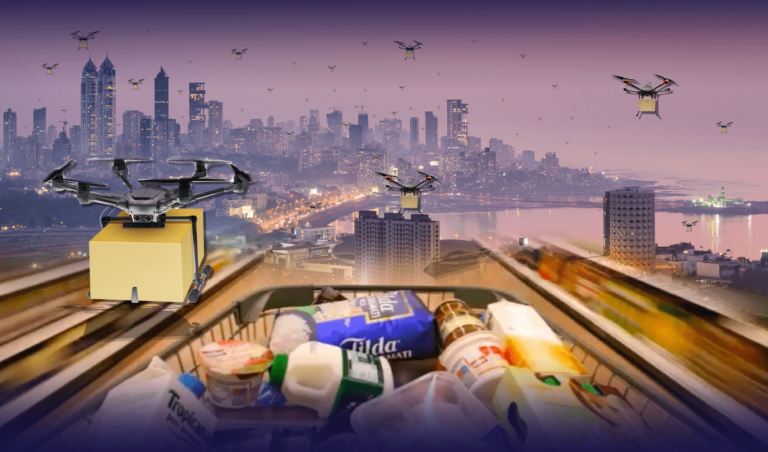E-Commerce, Grocery, Last Mile Delivery Optimization, Retail & CPG, Route Optimization, Supply Chain Optimization
What’s in store for FMCG in 2025? We just found out from experts
Sep 10, 2019
5 mins read

Future of FMCG Supply Chain: The global consumer goods industry is currently going through a phase of massive transformation. Companies now need to break traditions and implement solid new-age strategies in producing, selling and distributing goods. To discuss the changing dynamics of the FMCG industry and the trends that are shaping the future of consumer goods enterprises, Locus recently hosted FMCG 2025, a round table conference with industry experts, influencers and decision-makers.
The panel had distinguished professors and industry leaders from top FMCG enterprises like Unilever, Tata StarQuik, Dabur, Pepsico India, Godrej Consumer Products and Nestle to name a few. They discussed the several challenges and opportunities that lie ahead of modern FMCG enterprises, including the impact of e-commerce on the consumer market and the future of FMCG in rural India. The event was hosted by famed comedian Shashwat Maheshwari who added some jest and humor to the evening.
E-commerce is gradually becoming indispensable for the FMCG industry. More people are now preferring to buy consumer goods like edible foods, healthcare, personal wellness, pet care products, etc. online.
Mr. Nishith Aggarwal, Director of Customer Development, Route to Market South Asia, Unilever said “It is clearly evident that omnichannel is the way to go for FMCG enterprises. To successfully move from a traditional distribution set up, companies must leverage analytics to understand consumer data, gain meaningful insights from it and offer the customer exactly what they’re looking for.”
Mr. Karthik Shetty, co-founder of Bangalore-based FMCG enterprise Grocery Factory raised a burning issue. “Private labels in the market are a big competition and it’s only growing by the day. What could be an ideal strategy for FMCG businesses to tackle such competition from private players?”
“The best strategy for FMCG businesses is to be obsessed with the customer and his wants, rather than obsessing over the competition”, Mr. Nishith Aggarwal replied.
“E-commerce has opened a channel that everyone has to run after. It has truly empowered the consumer. If FMCG companies wish to stay ahead of the competition, they need to bring more value to the table. They need to grow in the interest of the consumer and innovate; not just by adopting multi-channel distribution but in terms of product innovation as well,” said Mr. K Radhakrishnan, who is the co-founder of StarQuik, a TATA enterprise.
India’s rural FMCG landscape is vast. It accounts for over 40% of the total FMCG market and is estimated to cross $100 billion by 2025. But in reality, the growth of FMCG in rural markets has been rather slow. The panel discussed how rural FMCG consumption is expected to evolve in the next 5 years.
“68% of India’s population resides in villages, that’s where over half of the FMCG consumption happens. The growth of FMCG in rural areas would certainly pick up in the near future, but companies need to spend more in terms of awareness, advertising, and distribution in the rural markets,” said Mr. Shivinder Singh, Head of Trade Marketing HPC and Sales IT, Dabur India.
The importance of effective transportation and infrastructure cannot be overlooked when talking about the growth of FMCG in rural India.
Dr. Harvinder Singh, Chairperson of Marketing Area, IMT Ghaziabad said, “While effective communication can ensure affordability, accessibility still largely depends on the quality of roads and transport in rural areas. Messages might travel in the air, but goods must travel on roads. True growth of FMCG in rural India will happen when distribution economics falls into place.”
Mr. LR Sridhar, Founder & CEO, Connect India E-Commerce Services Pvt Ltd, a last-mile delivery enterprise for rural India added, “At Connect India, we’re using the power of assisted commerce by connecting e-commerce to brick-and-mortar stores in over 2600 rural villages, enabling easy access to consumer products, agriculture seeds, medicines and more. In the future, FMCG enterprises can explore this opportunity to grow in rural markets.”
“FMCG enterprises could perhaps adopt an Ola or Uber model to simplify and improvise last-mile delivery of consumer goods from the nearest retail stores using application technology.” Ms. Mukta Khanna, Associate Director, PepsiCo India added.
The discussions were followed by stimulating a Q&A session around strategies, innovation, and revolutionary technologies in the FMCG supply chain.
Naveen Chordia, Vice President, Supply Chain, Drums Food, highlighted a critical challenge faced by businesses selling specific categories of FMCG products. “The challenge with short shelf-life products like Greek Yoghurt is finding the right channel and the right stores for a long-term growth partnership.”
“The real challenge here lies in brand promotion and not distribution. For products with a limited shelf-life, it is best to choose a few outlets and strive to penetrate the market in that category.”, Mr. Radhakrishna replied.
Mr. Bharath Rao, Go to Market Lead, Godrej Consumer Products, mentioned monitoring salesmen effectiveness as a major challenge in the distribution journey, especially in Rurban areas. “Today technology is all out there to help you solve such real-world issues. Partnering with tech start-ups and innovators is perhaps the best way to manage salesmen effectively and enhance efficiencies.” Mr. Nishith Aggarwal suggested.
“The role of technology is to understand a business problem and democratize effective logistics solutions which can be adopted by other companies in the industry facing similar issues”, pointed Mr. Krishna Khandelwal, Chief Business Officer, Locus.
FMCG 2025 highlighted the changing trends in the consumer goods landscape including the impact of consumerism and omnichannel competition and outlined a future outlook of the industry. More businesses in FMCG are now embracing new-age technology to streamline operations and are innovating in the interest of the consumer. Locus plans to host more such insightful industry-specific conferences in the near future.
Improve supply chain efficiency & productivity with Locus supply chain consulting services.

Related Tags:

Route Optimization
E-commerce disrupting the CPG landscape
Want to know how CPG eCommerce distributors can thrive in the changing scenario? Distributors have been an indispensable part of the CPG supply chain. CPG players have relied on their traditional partners to handle the sales, shipping, and servicing of the products to retailers in a specific geographic area or a particular class of business. […]
Read more
Last Mile Delivery Optimization
Implementing incentive-based pay for delivery executives: Performance over Pressure
Come hell or high water, your customer’s delivery always makes its way to the comfort of their home with the help of what are commonly known as delivery executives. These saviors work round the clock, and always turn up on your customer’s doorsteps with sunken eyes and broken smiles, clearly trying to deliver value with […]
Read moreMOST POPULAR
EDITOR’S PICKS
SUBSCRIBE TO OUR NEWSLETTER
Stay up to date with the latest marketing, sales, and service tips and news


What’s in store for FMCG in 2025? We just found out from experts